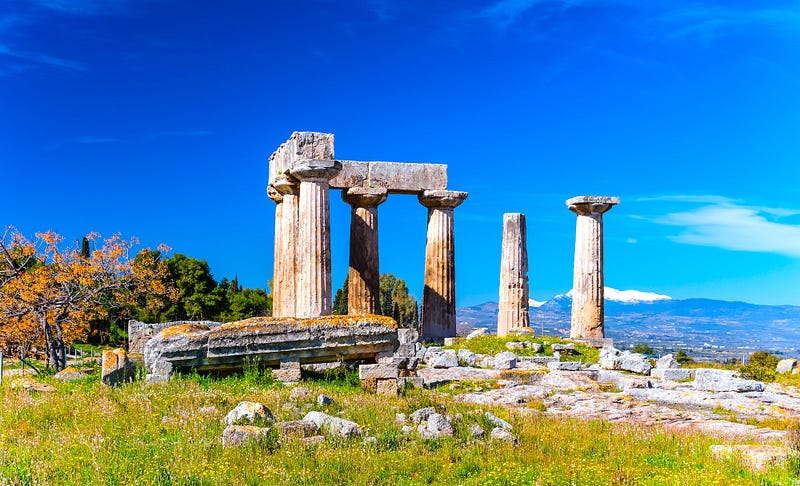Transforming Your Perspective with Stoic Wisdom
Written on
Chapter 1: The Essence of Stoic Wealth
In a world where time is often overlooked, recognizing its true value can lead to profound wealth.

Before diving into these Stoic concepts, there's an important truth to consider: even revered figures like Marcus Aurelius, a prominent Stoic, had their flaws. His life serves as a reminder that wisdom can emerge from imperfect individuals. All advice stems from those who embody both strengths and weaknesses; no one is purely virtuous.
Let’s delve into the Stoic principles that can radically alter your outlook on life.
Section 1.1: Cultivating Self-Sufficiency
“Self-sufficiency is the greatest of all wealth.” (Epicurus)
This quote has been a guiding principle in my life. The modern concepts of entrepreneurship, digital nomadism, and personal freedom are merely contemporary interpretations of this ancient Stoic idea. Unfortunately, the true essence of self-sufficiency has been diluted by social media influencers, who often prioritize appearances over genuine independence.
Real wealth lies in the freedom to direct your own time and resources, unencumbered by the demands of a boss or societal expectations. Achieving this often requires embracing risk and overcoming the fear of judgment from peers. While it may feel lonely at first, the eventual reward is a life of autonomy, free from the need for validation.
Section 1.2: Mastering Your Finances
“Wealth is the slave of a wise man and the master of a fool.” (Seneca)
You might have heard the saying, “make money work for you.” This principle is deeply rooted in Stoic philosophy. The consumer mindset encourages us to be slaves to our finances, constantly chasing material possessions. Instead, the Stoics advocated for becoming investors—making your money work for you rather than the other way around.
Investing in assets like stocks, side businesses, or digital products can provide you with greater leverage. The modern equivalent is creating digital assets—be it books, online courses, or innovative software—that can generate income over time.
Chapter 2: Understanding Contentment
Section 2.1: Redefining Poverty
“Being poor is not having too little, it is wanting more.” (Seneca)
The consumer culture often leads us to believe we need more to be happy. This notion fueled the rise of minimalism, highlighting that controlling our desires can lead to a more fulfilling life with less. By embracing frugality, we can reduce our need for material possessions and, in turn, free up time for richer experiences.
Section 2.2: Embracing Randomness
“No one has it worse than the person who is deprived of randomness.” (Seneca)
The conventional view of happiness often misinterprets the pursuit of fortune and fame. In reality, what we often lack is spontaneity. Modern life can feel monotonous, akin to being trapped in a "Matrix" of routine. True joy lies in the unexpected moments that break the cycle—whether it’s a new route to work or a conversation with a stranger.
Even small changes can add variety to life; embracing randomness can reinvigorate your daily experiences.
The first video, "50 (Short) Rules For Life From The Stoics," explores essential Stoic principles that can empower you to navigate life's challenges.
Section 2.3: The Cost of Inaction
“You can also commit injustice by doing nothing.” (Marcus Aurelius)
In our society, many movements advocate for change, yet often fall short in tangible action. It’s easy to participate in discussions but challenging to take meaningful steps toward change. Real impact requires more than just words; it demands action.
Section 2.4: Valuing Time
“People are frugal in guarding their personal property. But as soon as it comes to squandering time they are most wasteful of the one thing in which it is right to be stingy.” (Seneca)
Time is a precious resource, often wasted without thought. The Stoics understood that valuing time is paramount. By learning to say no and prioritizing how we spend our time, we can reclaim our most valuable asset.
In the second video, "9 Stoic Keys to Outsmarting Everyone Else," discover practical Stoic strategies for mastering your time and improving your life.
Section 2.5: Conquering Mental Barriers
“We suffer more in imagination than in reality.” (Seneca)
Overthinking can lead to unnecessary suffering. Our minds can amplify fears and anxieties that are often unfounded. Surrounding yourself with wise individuals who can provide perspective is crucial. They can help you navigate your thoughts and alleviate mental burdens.
Section 2.6: The Power of Doing Less
“If you seek tranquility, do less.” (Marcus Aurelius)
In our hustle-oriented culture, busyness is often glorified. However, true peace comes from simplicity. I’ve found that spending quality time with loved ones, rather than filling every moment with activities, leads to greater fulfillment.
Lastly, remember that when faced with criticism or negativity, it’s essential to stay focused on your purpose.
“Dogs bark at what they cannot understand.” (Heraclitus)
In the realm of online discourse, criticism often arises from misunderstanding. The best response is to encourage critical thinking rather than engaging in conflict.
Ultimately, strive to provoke thought, and don’t be swayed by every barking dog. Focus on your journey and the impact you wish to create.